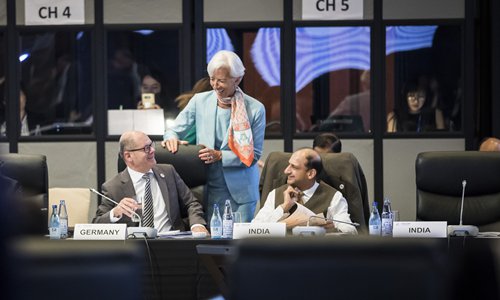G20 a chance for Beijing, Washington to ‘reset tone’

German Finance Minister Olaf Scholz (left) talks to Christine Lagarde (center), Managing Director of the International Monetary Fund, during the annual G20 Finance and Central Bank Deputies Meeting in Fukuoka, Japan. Photo: VCG
As China called on joint efforts to promote free trade at the G20 Summit to be held later this month, observers noted that the summit, where leaders from China and the US are likely to meet, is also a chance to restart the stalled trade negotiations and save the global market from more uncertainties.
At the daily briefing on Monday, Foreign Ministry spokesperson Geng Shuang neither confirmed nor denied a meeting between Chinese President Xi Jinping and US President Donald Trump at the summit in Japan.
China will release information "in a timely manner," Geng said.
The meeting, if it happens, could be a chance for China and the US to reset the tone of their relations that are enduring embarrassing and frustrating moments, said Li Haidong, a professor at China Foreign Affairs University.
One particular facet of China-US relations is that their leaders' interactions have played a constructive and leading role in saving relations from deteriorating at critical moments, Li said.
Chance for a new truce
US Treasury Secretary Steven Mnuchin said Saturday that the highly anticipated meeting between Xi and Trump "has some parallels" with their Buenos Aires summit in December that postponed a tariff hike, Reuters reported.
The summit in December 2018 marked the start of a five-month trade truce between the US and China to allow for negotiations to end their intensifying trade war. But those talks hit an impasse last month, prompting both sides to impose higher tariffs on each other's goods.
Geng said that for negotiations to resume, the US should show more sincerity as the US should take full responsibility for the frustrated negotiations.
China has repeatedly stressed that it does not want to fight a trade war but it is not afraid of one, vowing to "never give in" on issues of principle and to use "necessary measures" to safeguard the interests of the country and its people.
"If the US is willing to negotiate in an equal manner, our door is open, but if the US insists on escalating the trade frictions, we will respond resolutely and fight until the end," Geng said at the routine briefing on Monday.
Earlier, Mnuchin said at a news briefing that the meeting during G20 was where the "main progress" could be made toward reviving talks to end the US-China trade conflict.
"The US and Chinese presidents should go on a weekend retreat," according to New York Times columnist Thomas L. Friedman on June 4. "They and the rest of the world will regret the result if their reprisals over trade issues keep escalating," Friedman wrote.
Trade and geopolitical tensions have "intensified" and raised risks to improving global growth, G20 finance leaders said in a communiqué released on Sunday after their meeting in Japan.
Though the summit is still two weeks away, the US has not stopped its threats against China. Mnuchin said on Sunday that Trump might ease US restrictions on Huawei if there was progress in the trade row with China - but absent a deal, Washington would maintain tariffs to cut its deficit, Reuters reported Sunday.
Mnuchin also said that Trump had no qualms about introducing more tariffs on Chinese imports if no progress is made on the stalled negotiations during his meeting with President Xi at the G20 meeting, South China Morning Post reported Sunday.
Every one hopes the meeting could help restart the negotiations, but the US has to show more sincerity, Bai Ming, deputy director of the Ministry of Commerce's International Market Research Institute, calling for more prudence for any result, told the Global Times on Monday.
The point is not about whether to have negotiations. It's about negotiating on which principle and for whose benefit, said Bai.
He stressed that the US should not ask for too much, as a deal that violates China's principles is pointless and won't be agreed upon.
Analysts noted that the repeated flip-flops by the US during trade negotiations are the largest obstacle for the two sides to reach a substantial outcome, and that the fundamental problems behind the trade war are not going to be solved easily in the short term.
However, though Trump seems tough in his rhetoric on trade issues, he is sure that his 2020 presidential election campaign won't proceed smoothly if US farmers and workers - the core of his voters— continue to suffer from the trade war, Li said.
Consistent efforts
Meanwhile, experts noted that China's diplomacy is not all about its relations with the US, and the country's efforts to safeguard a free and open trade system, promote WTO reforms and oppose protectionism and "economic extremism" are consistent and will be further displayed at the G20 summit.
China is willing to work with all parties to advance reforms in the WTO so that the world organization can play a bigger role in global economic governance, the Ministry of Commerce said in May 2018.
In a WTO reform proposal submitted on May 13, China identified four aspects which deserve major action. Support for the WTO to make necessary reforms to help it solve the current crisis and respond to the needs of the times were also expressed, the Xinhua News Agency reported on May 14, citing insiders.
Newspaper headline: China urges free trade efforts